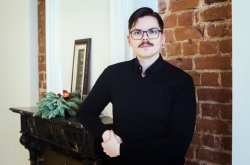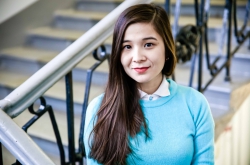This year you enrolled in a Master’s program at ITMO University. Before that, you already spent quite some time working in the industry. What was your career like before you came here?
I’ve been into tech since my childhood; I wasn’t all that interested in the humanities, although I had a pretty diverse upbringing: went to sports clubs, attended a musical school. In seventh or eighth grade I decided to transfer to a mathematics-heavy school to acquire a deeper, better knowledge of STEM subjects. After that, I applied to St. Petersburg State University’s Mechanics and Mathematics Faculty and graduated from the Computer Science Department there.
I went there with the intention of getting a general education in tech, as I did not yet decide what I wanted to do in life. There wasn’t a specific focus in the program, we were simply taught about mathematics and programming. In my second year, I was recommended to a company that develops trading software. That was my first work experience, although it wasn’t very long – a little less than three months. First of all, it’s difficult to combine work and studies when you’re a second-year student and, secondly, I believe that back then I wasn’t really able to work on a project I would be genuinely interested in. Still, this experience helped me reconsider my priorities – until then, I didn’t really know what area of IT I should choose. I realized that what interests me isn’t just development, but work in science-heavy projects that involve advanced mathematics.
I got the chance to try my hand at such work after I graduated. I was hired for lab work by a computer security company. I wrote code obfuscators and often had to refer to scientific articles – two or three a week - , as well as create proof of concept. The tasks I was given were very unique – there are very few companies that do this sort of thing in Russia.

A Google research laboratory
After that, I did some freelance work on small projects, but after a while I realized that this kind of work requires more experience and found a job as a backend developer. Compared to my previous ones, it was quite boring. It involved a lot of simple, routine tasks, while I wanted to do something more or less related to math.
Is the basic Bachelor’s education enough to work on complex, science-heavy tasks? How did you come to realize that you need to study further?
Everything depends on one’s will and perseverance. Practically everyone I know works in IT. When I spoke to others, found out new things, I realized that I’d like to work in data science. Looking at the current market, it was clear that I’d need a Master’s or a Ph.D. to have a shot at this kind of work. That’s when I started thinking that I need to continue my education, considered my options and tried to pick the best one.
Former classmates from my SPSU days told me about ITMO’s High-Performance Computing Department. I looked into it and evaluated the advantages ITMO might have over other universities, as well as the opportunities it provides in regards to scientific or industrial work.
What determined your choice?
I think that data science will remain a promising field for a long time; it is actively developing right now and this trend will remain in the future. To be a specialist in this field, it is important to study machine learning which, in a way, is the basis for all future systems. That is why I decided to go with this department. Besides, I knew that here I’d have the opportunity to participate in academic mobility and double degree programs.
Notably, you can only get into the HPC Department by passing an entrance exam – there are no portfolio competitions or other kinds of privilege, and I think that’s very fair. Still, had I not got in, I would have still continued my education – perhaps even went abroad.

High-Performance Computing Department
Is it right to say that it’s important for today’s IT specialists to have some research background? Why do they need to get involved in science?
Getting immersed into the scientific community, learning about the latest trends and inventions, and working on scientific projects – it all helps a specialist remain modern, especially in IT. In terms of engineering, everything that happens in IT only stays relevant for a year or two. There is more demand for IT specialists who are familiar with the latest research and technology. It’s no coincidence that the tech giants like Google, Facebook and others are investing serious amounts of money into their R&D branches.
Of course, everyone has their own requirements. For instance, if an employer needs backend app developers, they’ll gladly take in even someone who hasn’t gotten their Bachelor’s. Many companies in IT these days need specialists who can quickly figure things out and apply that knowledge in practice. Some of them might not even ask what sort of education you have and where you got it: if you can handle the work, you’re in.
But, judging by my experience with major corporations, preference is still given to those who have a Master’s degree – and, of course, a solid background. Another important thing: people who come to work at big companies either don’t know or don’t want to know that in these kinds of places, the higher positions are given to those who have a Ph.D.
In this regard, experience of work or education abroad gains additional importance. You’ve already mentioned the possibility of yours taking part in an academic mobility program. What are your options?
In September of this year, I applied for an academic exchange program. In spring of 2018, I will go to Aalto University in Finland. An opportunity to study in another country is not only an important life experience, but also a chance to receive even better education. There are not that many universities that provide students with great academic mobility opportunities; there are even less of those that let you attend courses abroad and have the credits transferred to your “home” university. Oftentimes, departments demand that students still take exams on the courses that they’ve missed due to being abroad. At our department, such missed courses are marked as completed for exchange students, which is great.

Aalto University
What is the best way to plan out your educational track at a partner university?
When studying abroad, you can select courses so that the program combines both the subjects you would have learned at your “main” university and those that you wouldn’t be able to learn back home. For example, I’d found out that, in addition to the minimum set that my department suggests, I can choose more subjects at Aalto University once I get there. When choosing courses, you are also allowed to only attend those you find useful and interesting – nobody’s forcing you to learn something you’re not interested in.
I also intend to participate in a joint program that the HPC Department has with the University of Amsterdam – that’s my plan for the second year of my Master’s program. There are some nuances: to get there, one needs to pass a competitive selection and defend a research paper at the end of the semester. Moreover, the paper is evaluated not only by Russian experts, but those from the partner university, as well.
What are the steps one needs to complete to go abroad through an academic mobility program?
First they need to pass a selection process at the academic mobility department. Reasons for approval include personal achievements, their academic record and scientific work. Aalto University has similar requirements, including an academic transcript for the previous semesters. Applicants also need to express their interest and motivation for the program. Once they are approved, the departments negotiate the curriculum, corresponding courses and the plan for the student’s research project.
As for me, I’ve already picked an area of study in which I will conduct my project. Aside from studying at Aalto University, I will also work remotely on my research paper with my scientific supervisor. Besides, if we do need to meet in person, I can simply come to St. Petersburg for day’s visit. My work has to do with analyzing how information propagates in social networks. Later on, once I have some solid results, I might expand the subject or continue the work in a related area of study.

What is the best way of combining work and a Master’s education?
It’s pretty difficult to juggle office work and full-time studies. I know a lot of people who’ve studied while working full-time, but the quality of education drops in such conditions. With IT, it’s advisable to first try finding a way to work remotely, preferably part-time. It would be difficult, seemingly impossible, but with enough effort you can find an employer who’s in need of such workers.
How do you see your future after you finish your Master’s education?
There are currently a lot of prospects for development in my field. It’s possible to apply one’s skills and knowledge at a research laboratory in some major company; or you could solve business challenges at an innovative company or a startup. There are so many opportunities. I believe that the most important thing is to come to a decision and find what interests you. When a person does something they don’t enjoy, they aren’t very likely to be effective at it.
It’s not even that difficult to find a company that satisfies your interests and corresponds to your level of education. You’ll see what kind of specialists the company needs and what sorts of tasks they’ll give you as early as during the interview stage. These aspects are important, as people who have sufficient knowledge and experience want to be surrounded by those of equal or higher skill.
Today, knowledge, especially in-depth knowledge, is highly valued. Of course, it all depends on the company and its goals, but, if you already have a wide range of knowledge and skills, you’ll be appreciated anywhere.





